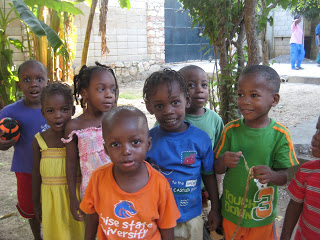We’ve been in the process with Haiti for a long time now, and naturally our friends and family are checking in with us frequently to ask for updates. I love that people are with us in this journey, and concerned enough to be asking. I’m never quite sure how to answer, though, especially as people become frustrated and indignant on my behalf. Because aside from the “When is he coming home?” question, the most common follow-up questions I get are along the lines of, “Don’t these people know he needs to come home/Don’t they care/How could they do this to him/you?” This is the question that I have a hard time explaining. Here is me trying:
First of all, there are many, many people involved in the process of adopting a child from Haiti. In our case, the missionaries who work with the orphanage and who are processing our paperwork care very much. However, they are working within the limitations of a country with absolutely no infrastructure, that operates in a state of crisis even on the best of days. Imagine the DMV in the US. Then imagine that we went into that office, took away all the computers, the electricity, the air-conditioning, and half of the employees. And then we flung the files all over the floor, and restacked them in a corner, and then lined up 500 families holding a 250 page dossier that needs the stamps of 10 lazy and impossible to find government officials. Then you might have some inkling of what these people are up against.
So yes, those people do care. Now, the people working in the government office – do they care? It’s hard to say. First of all, adoption is very misunderstood in Haiti. It is not a common practice. What the Haitians do understand, all too well, is the concept of a family taking in a child as a slave. The Restavek practice is extremely prevalent in Haiti, which is when an extremely poor family sends one of their children (or all ) to live with a wealthier family to perform household tasks in exchange for food and shelter. These children are often beaten and mistreated, and spend their days living like slaves and rarely get to attend school. It’s an acceptable practice in Haiti because the mindset is that this child would not have survived without the arrangement. I would imagine that when families come from the US wanting to bring a child home to Haiti, that Haitians might assume that we are looking for our own live-in. I don’t feel confident that many of the people approving our papers understand us to be a loving family who views Keanan as one of our own children. I can understand why the Restavek prevalence would make people less enthused about adoption, when they have never seen adoption as we know it.
In addition, Haiti is one of the most corrupt countries in the world. In the top ten at last count. I’m not gonna get into that whole thing on a public blog, but yeah. I’m sure it is affecting international adoptions (as it affects most systems in Haiti).
I also think that it is hard for Americans to understand just how bad things are in Haiti. I don’t know that there is ever going to be an urgency to process adoptions from their government because, really, it’s not their biggest fish to fry. Most of the children waiting to be adopted are living in missionary-run orphanages (or creches). Some of these places are great, some are appalling, but most are better than the conditions thousands of impoverished Haitians live in on a daily basis. For example, here is a picture of the kids at our orphanage (my guy in blue in the middle):
Do they need to go home to their families? Heck yeah, they do. But they are also getting three squares a day, and these kids (who have toys and extra clothes and decent shoes and medical care) are wealthy by Haitian standards. Granted, not every orphanage is like this . . . but thank God some of them are.
 Now you juxtipose this with the reality that 20% of Haiti’s children under age five are severely malnourished. Twenty percent. SEVERELY malnourished.
Now you juxtipose this with the reality that 20% of Haiti’s children under age five are severely malnourished. Twenty percent. SEVERELY malnourished.


Wow, you articulated this so well. So very well. Thanks for taking the time to process this out. I helps me a lot as I try to explain things. I'm going to have to send people to read this when I don't know what to tel them!
Thanks for posting this. I think a lot of people in the US just have no idea what Haiti is going through. Most people think of Africa when they think of starving children…and rightly so as there are many of them in Africa. But, there are also MANY in Haiti and Haiti is SO CLOSE to us (the US) it is mind boggling to think about. I also found it interesting that the US is not on the top 10 list of least corrupt nations…
Very well said, thanks for this. I'm going to post a link to it…….